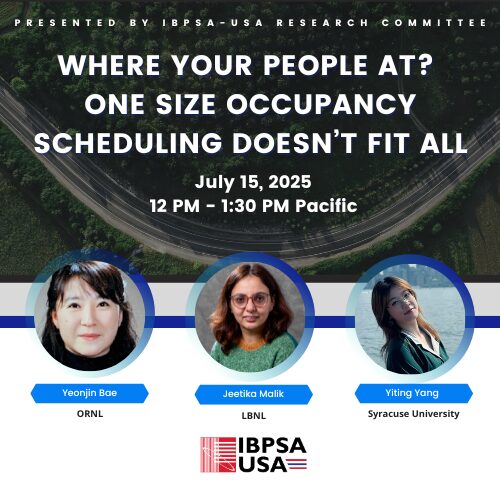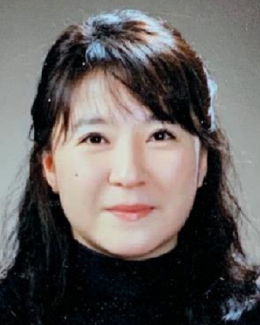
Where Your People At? One Size Occupancy Scheduling Doesn’t Fit All
Occupancy plays a key role in the amount of energy used in a building, whether through direct occupant actions or equipment. Building occupancy schedules help to model human behavior, but static schedules fail to represent the increase in remote work since 2020. But how can we accurately model building occupancy changes throughout the day and year? Hear about and discuss these topics and more at our upcoming summer IBPSA-Mixa talk on building occupancy. Three speakers will discuss their work, and then we’ll open to questions and discussion.
Bae, Yeonjin will talk about a single standard occupancy schedule cannot adequately represent all buildings—particularly college buildings, which include diverse space types within one structure. A simple yet scalable data-driven approach will be introduced, leveraging class reservation data from U.S. universities to generate realistic, space-specific occupancy schedules. The resulting patterns reveal how college buildings differ from typical school buildings from a building energy modeling perspective.
Jeetika Malik will present work on occupant modeling under the international project- IEA-EBC Annex 79. Level-of-Detail (LoD) framework to address how we can model dynamic occupancy patterns across days, seasons, and building types, offering a tiered approach to representing occupancy with varying degrees of behavioral, temporal, and spatial resolution.
Yiting Yang’s research introduces a level-of-detail framework for occupancy modeling in urban building energy modeling that helps researchers select suitable approaches based on project requirements and data availability. Validation through an Arizona case study confirms its ability to inform occupancy modeling choices while balancing complexity with implementation practicality.
Speakers

Yeonjin Bae
Dr. Yeonjin Bae is an R&D Staff in the Grid Interactive Controls Group in the Electrification and Energy Infrastructure Division at ORNL. She received PhD degree in Civil Engineering from Purdue University in 2016 and joined the ORNL in 2019. Currently she is involved in various DOE-funded projects regarding building energy modeling and validation based on the extensive background for simulation/modeling and energy efficient building system optimization. She is the subprogram manager at ORNL for the Tech-to-Market program, a part of the Building Technologies Program. The Tech-to-Market program pilots and evaluates innovative programs that eliminate the common barriers promising technologies face along the pathway to market. This includes a buildings-focused university student competition called JUMP into STEM and a new BTO Fellowship program called IBUILD. Also, she is an active member of the International Building Performance Simulation Association (IBPSA) and the American Society of Heating, Refrigerating and Air-Conditioning Engineers (ASHRAE), and is a voting member of ASHRAE TC 7.6, Building energy performance.

Jeetika Malik
Jeetika Malik is a Research Scientist with the Building Technology and Urban Systems Division of Lawrence Berkeley National Laboratory. Her research efforts are directed towards improving thermal and grid resilience within buildings, evaluating building technologies for effective policymaking and housing affordability, and exploring human factors related to building design and operations. Dr. Malik holds a Ph.D. from IIT Bombay, India, and actively contributes to IEA EBC Annexes, ASHRAE Technical Committees, and other professional societies. Her research bridges technical modeling with real-world decision support for utilities, cities, and resilience planning.

Yiting Yang
Yiting Yang is a second-year PhD student in the Department of Mechanical and Aerospace Engineering at Syracuse University, where she conducts research under the supervision of Dr. Bing Dong in the Built Environment Science & Technology (BEST) Laboratory. Her research focuses on urban-scale occupancy behavior, HVAC system control, and human mobility modeling.
